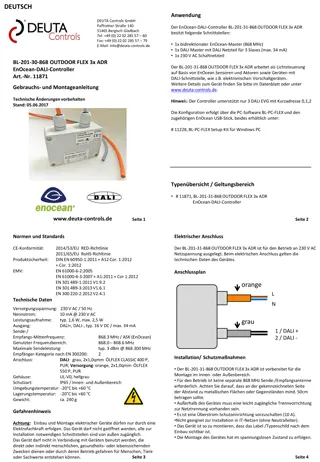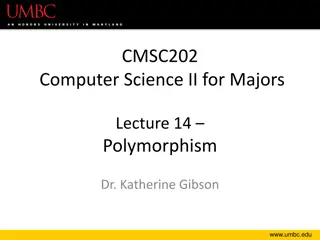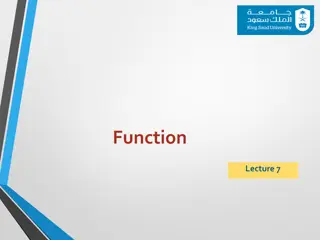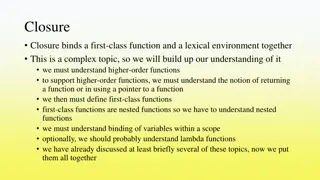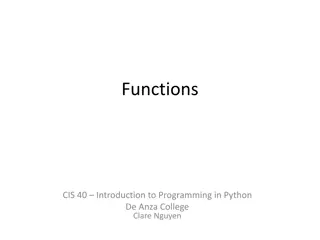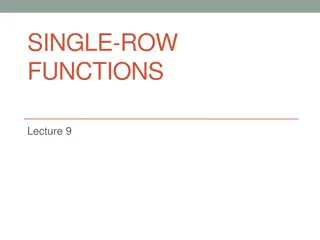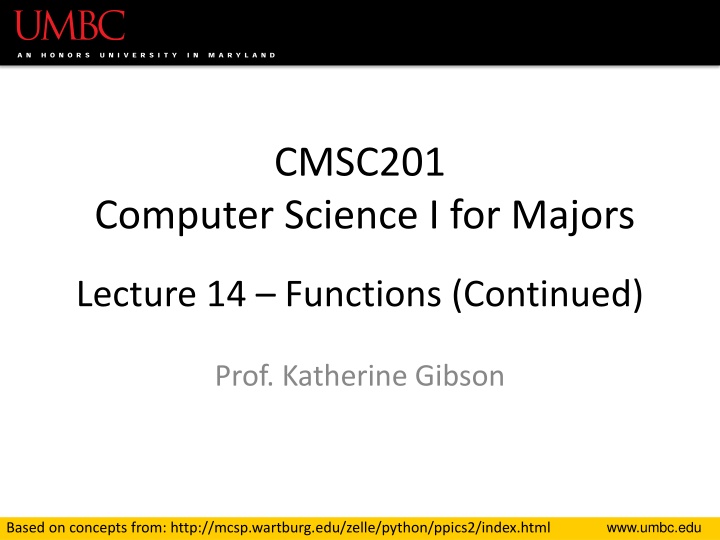
Functions in Computer Science I: Lecture 14 Recap
Explore the importance of functions in computer science as discussed in Lecture 14, covering topics like function calls, variable scope, parameter passing, and more. Get insights into value-returning functions and the significance of modular programming. Dive into examples and vocabulary to solidify your understanding.
Download Presentation

Please find below an Image/Link to download the presentation.
The content on the website is provided AS IS for your information and personal use only. It may not be sold, licensed, or shared on other websites without obtaining consent from the author. If you encounter any issues during the download, it is possible that the publisher has removed the file from their server.
You are allowed to download the files provided on this website for personal or commercial use, subject to the condition that they are used lawfully. All files are the property of their respective owners.
The content on the website is provided AS IS for your information and personal use only. It may not be sold, licensed, or shared on other websites without obtaining consent from the author.
E N D
Presentation Transcript
CMSC201 Computer Science I for Majors Lecture 14 Functions (Continued) Prof. Katherine Gibson www.umbc.edu Based on concepts from: http://mcsp.wartburg.edu/zelle/python/ppics2/index.html
Last Class We Covered Functions Why they re useful When you should use them Calling functions Variable scope Passing parameters 2 www.umbc.edu
Any Questions from Last Time? www.umbc.edu
Todays Objectives To introduce value-returning functions (return) To understand how modifying parameters can change their values To practice function calls and some special situations To reinforce the value of modular programming 4 www.umbc.edu
Function Review www.umbc.edu
Function Vocabulary function ________ _____ _________ function _____ def myFunc(year, name) # inside statements function ___ def main(): myFunc(2015, "Xavier") main() _____ _________ 6 www.umbc.edu
Function Vocabulary function definition formal parameters function body def myFunc(year, name) # inside statements function call def main(): myFunc(2015, "Xavier") main() actual parameters 7 www.umbc.edu
Visual Code Trace def main(): sing("Fred") print() sing("Lucy") def happy(): print("Happy BDay to you!") def sing(person): happy() print("Happy BDay", person) happy() happy() 8 www.umbc.edu
Visual Code Trace def main(): sing("Fred") print() sing("Lucy") person = "Fred" def happy(): print("Happy BDay to you!") def sing(person): happy() print("Happy BDay", person) happy() happy() Note that the person variable in sing() disappeared! person: "Fred" 9 www.umbc.edu
Return Statements www.umbc.edu
Giving Information to a Function Passing parameters provides a mechanism for initializing the variables in a function Parameters act as inputs to a function We can call a function many times and get different results by changing its parameters 11 www.umbc.edu
Getting Information from a Function We ve already seen numerous examples of functions that return values int() , str(), open(), input(), etc For example, int() takes in a string or double, and returns the integer of that Or 0 if nothing is passed in to it 12 www.umbc.edu
Functions that Return Values To have a function return a value after it is called, we need to use the return keyword def square(num) # return the square return (num*num) 13 www.umbc.edu
Handling Return Values When Python encounters return, it Exits the function Returns control back to where the function was called The value provided in the return statement is sent back to the caller as an expression result 14 www.umbc.edu
Code Trace: Return from square() Let s follow the flow of the code def square(num1): return num1 * num1 def main(): x = 5 y = square(x) print(y) main() Step 1: Call main() Step 2: Pass control to def main() Step 3: Set x = 5 Step 4: See the function call to square() Step 5: Pass control from main() to square() Step 6: Set the value of num1 in square() to x Step 7: Return to main() and set y = return statement Step 8: Print value of y 15 www.umbc.edu
Code Trace: Return from square() Let s follow the flow of the code def square(num1): return num1 * num1 def main(): x = 5 y = square(x) print(y) main() Step 1: Call main() Step 2: Pass control to def main() Step 3: Set x = 5 Step 4: See the function call to square() Step 5: Pass control from main() to square() Step 6: Set the value of num1 in square() to x Step 7: Return to main() and set y = return statement Step 8: Print value of y 16 www.umbc.edu
Testing: Return from square() >>> square(3) 9 >>> print(square(4)) 16 >>> x = 5 >>> y = square(x) >>> print(y) 25 >>> print(square(x) + square(3)) 34 17 www.umbc.edu
Function with Multiple Return Values www.umbc.edu
Returning Multiple Values Sometimes a function needs to return more than one value To do this, simply list more than one expression in the returnstatement def sumDiff(x, y): sum = x + y diff = x y return sum, diff 19 www.umbc.edu
Accepting Multiple Values When calling a function with multiple returns, use multiple assignments Assignment is based on position, just like passing in parameters is based on position s, d = sumDiff(num1, num2) 20 www.umbc.edu
Accepting Multiple Values def main(): num1 = int(input("Enter first number: ")) num2 = int(input("Enter second number: ")) s, d = sumDiff(num1, num2) print("The sum is", s, "and the difference is", d) def sumDiff(x, y): sum = x + y diff = x - y return sum, diff main() 21 www.umbc.edu
Accepting Multiple Values def main(): num1 = int(input("Enter first number: ")) num2 = int(input("Enter second number: ")) s, d = sumDiff(num1, num2) print("The sum is", s, "and the difference is", d) s gets the first value returned d gets the second value returned def sumDiff(x, y): sum = x + y diff = x - y return sum, diff main() 22 www.umbc.edu
Every Function Returns Something All Python functions return a value, whether they contain a return statement or not Functions without an explicit return hand back a special object, denoted None 23 www.umbc.edu
Common Errors and Problems A common problem is writing a function that is expected to return a value, but forgetting to include the return statement If your value-returning functions produce strange messages, check to make sure you remembered to include the return! 24 www.umbc.edu
Modifying Parameters www.umbc.edu
Other Ways to Pass Back Information Return values are the main way to send information back from a function We may also be able to pass information back by making changes directly to the parameters One of the problems with modifying parameters is due to the scope we discussed 26 www.umbc.edu
Functions that Modify Parameters Suppose you are writing a program that manages bank accounts. One function we would need to create is one to accumulate interest on the account. def addInterest(balance, rate): newBalance = balance * (1 + rate) balance = newBalance www.umbc.edu
Functions that Modify Parameters The intent is to set the balance of the account to a new value that includes the interest amount. def main(): amount = 1000 rate = 0.05 addInterest(amount, rate) print(amount) 1000 bash-4.1$ Output bash-4.1$ python interest.py def addInterest(balance, rate): newBalance = balance * (1 + rate) balance = newBalance main() Is this the expected output? www.umbc.edu
Functions that Modify Parameters We hope that that the 5% will be added to the amount, returning $1050 Was $1000 the expected output? No so what went wrong? Let s trace through the program and find out www.umbc.edu
Functions that Modify Parameters First, we create two variables that are local to main() def main(): amount = 1000 rate = 0.05 addInterest(amount, rate) print(amount) Local Variables of main() def addInterest(balance, rate): newBalance = balance * (1 + rate) balance = newBalance main() www.umbc.edu
Functions that Modify Parameters Second, we call addInterest() and pass the local variables of main() as actual parameters Passing amount and rate, which are local variables def main(): amount = 1000 rate = 0.05 addInterest(amount, rate) print(amount) Call to addInterest() def addInterest(balance, rate): newBalance = balance * (1 + rate) balance = newBalance main() www.umbc.edu
Functions that Modify Parameters Third, when control is passed to addInterest(), the formal parameters of (balance and rate) are set to the actual parameters of (amount and rate) def main(): amount = 1000 rate = 0.05 addInterest(amount, rate) print(amount) balance = amount rate = rate Control passes to addInterest() def addInterest(balance, rate): newBalance = balance * (1 + rate) balance = newBalance main() www.umbc.edu
Functions that Modify Parameters Even though the parameter rate appears in both main() and addInterest(), they are separate because of scope def main(): amount = 1000 rate = 0.05 addInterest(amount, rate) print(amount) Even though rate is in both main() and addInterest(), they are in different places in memory def addInterest(balance, rate): newBalance = balance * (1 + rate) balance = newBalance main() www.umbc.edu
Functions that Modify Parameters In other words, the formal parameters of a function only receive the values of the actual parameters The function does not have access to the variable that holds the actual parameter We call this passing parameters by value www.umbc.edu
Functions that Modify Parameters Some programming languages (C++, Ada, and many more) do allow variables themselves to be sent as parameters to a function This mechanism is called passing by reference When passing by reference, the value of the variable in the calling program actually changes www.umbc.edu
Functions that Modify Parameters Since Python doesn t have this capability, one alternative would be to change the addInterest function so that it returns the newBalance www.umbc.edu
Functions that Modify Parameters def addInterest(balance, rate): newBalance = balance * (1 + rate) return newBalance def test(): amount = 1000 rate = 0.05 amount = addInterest(amount, rate) print(amount) test() www.umbc.edu
Code Trace (return statement) Let s follow the flow of the code def addInt(balance, rate): newBal = balance * (1 + rate) return newBal def main(): amount = 1000 rate = 0.05 amount = addInt(amount, rate) print(amount) main() Step 1: Call main() Step 2: Pass control to def main() Step 3: Set amount = 1000 and rate = 0.05 Step 4: Set amount = return statement of addInt() Step 5: Pass control from main() to addInt() Step 6: Set the value of balance in addInt() to amount Step 7: Set the value of rate in addInt() to rate Step 8: Set value of newBal to balance * (1 + rate) Step 9: Return to main() and set value of amount = newBal Step 10: Print value of amount Once we leave addInt(), the values of balance and rate are removed from memory www.umbc.edu
Functions that Modify Parameters Instead of looking at a single account, say we are writing a program for a bank that deals with many accounts We could store the account balances in a list, then add the accrued interest to each of the balances in the list We could update the first balance in the list with code like: balances[0] = balances[0] * (1 + rate) www.umbc.edu
Functions that Modify Parameters This code says, multiply the value in the 0th position of the list by (1 + rate) and store the result back into the 0th position of the list A more general way to do this would be with a loop that goes through positions 0, 1, , length 1 www.umbc.edu
Functions that Modify Parameters # addinterest3.py # Illustrates modification of a mutable parameter (a list) def addInterest(balances, rate): for i in range(len(balances)): balances[i] = balances[i] * (1 + rate) def test(): amounts = [1000, 2200, 800, 360] rate = 0.05 addInterest(amounts, rate) print(amounts) test() www.umbc.edu
Functions that Modify Parameters Remember, our original code had these values: [1000, 2200, 800, 360] The program returns: [1050.0, 2310.0, 840.0, 378.0] What happened? Python passes parameters by value, but it looks like amounts has been changed! www.umbc.edu
Functions that Modify Parameters The first two lines of test create the variables amounts and rate. The value of the variable amounts is a list object that contains four int values. def addInterest(balances, rate): for i in range(len(balances)): balances[i] = balances[i] * (1+rate) def test(): amounts = [1000, 2200, 800, 360] rate = 0.05 addInterest(amounts, 0.05) print(amounts) www.umbc.edu
Functions that Modify Parameters www.umbc.edu
Functions that Modify Parameters Next, addInterest executes. The loop goes through each index in the range 0, 1, , length 1 and updates that value in balances. def addInterest(balances, rate): for i in range(len(balances)): balances[i] = balances[i] * (1+rate) def test(): amounts = [1000, 2200, 800, 360] rate = 0.05 addInterest(amounts, 0.05) print(amounts) www.umbc.edu
Functions that Modify Parameters www.umbc.edu
Functions that Modify Parameters In the diagram the old values are left hanging around to emphasize that the numbers in the boxes have not changed, but the new values were created and assigned into the list. The old values will be destroyed during garbage collection. def addInterest(balances, rate): for i in range(len(balances)): balances[i] = balances[i] * (1+rate) def test(): amounts = [1000, 2200, 800, 360] rate = 0.05 addInterest(amounts, 0.05) print amounts www.umbc.edu
Functions that Modify Parameters When addInterest terminates, the list stored in amounts now contains the new values. The variable amountswasn t changed (it s still a list), but the state of that list has changed, and this change is visible to the calling program. www.umbc.edu
Function Call Exercise www.umbc.edu
Function Calls As we have previously discussed, function calls pass actual parameters to a function definition The question is: what are valid actual parameters in Python? www.umbc.edu





